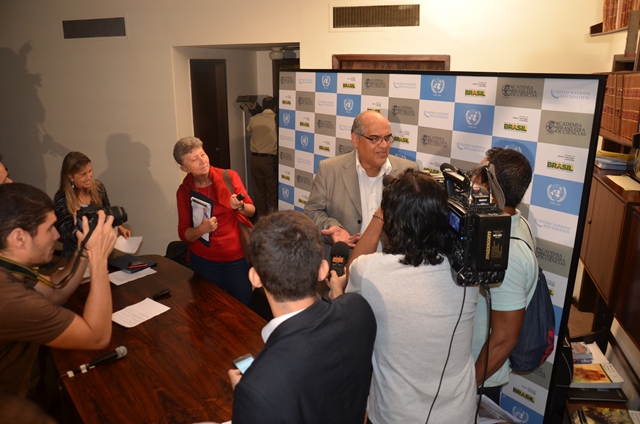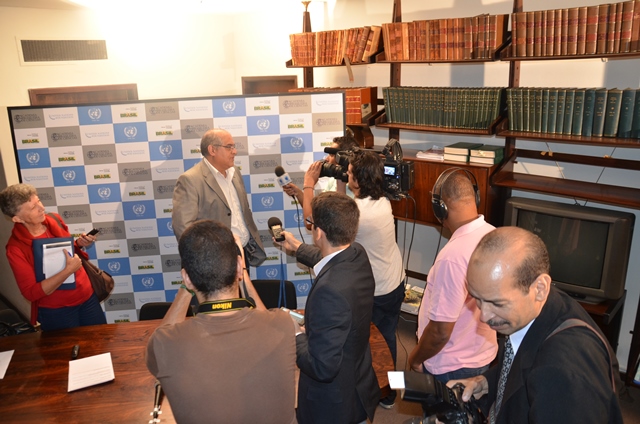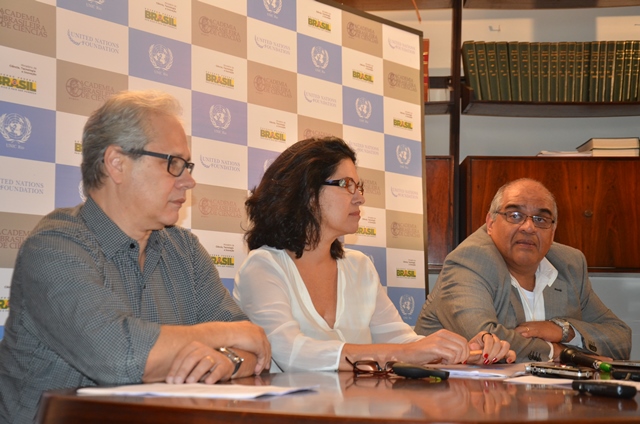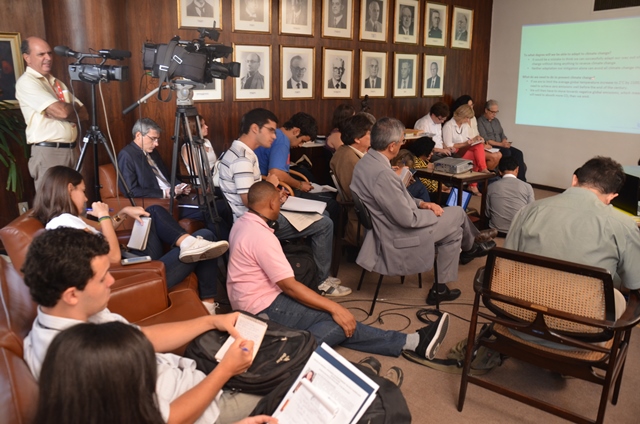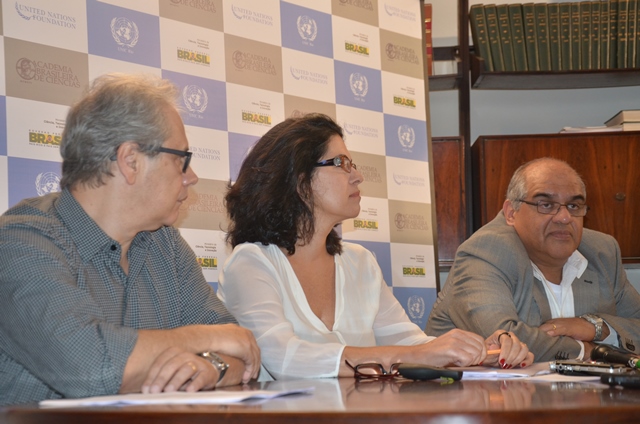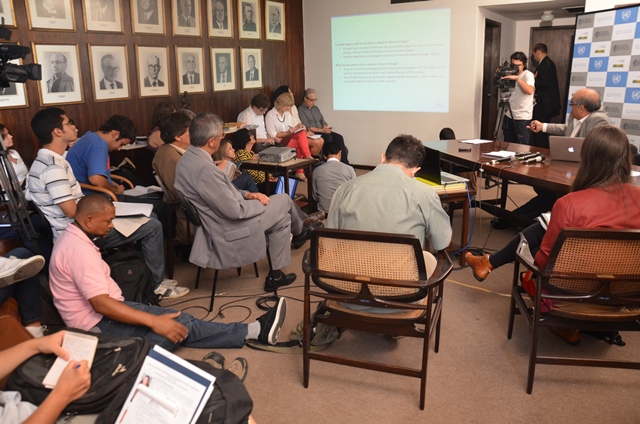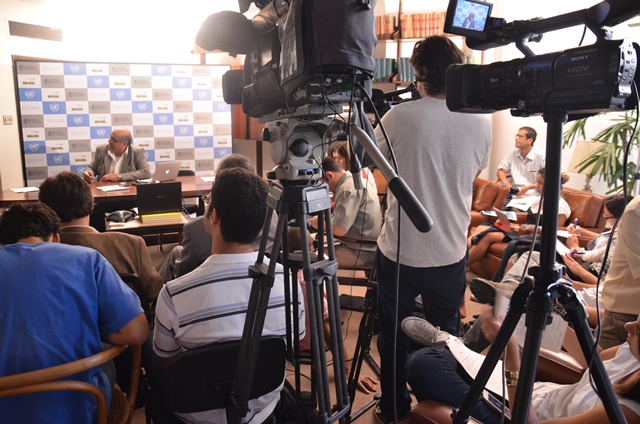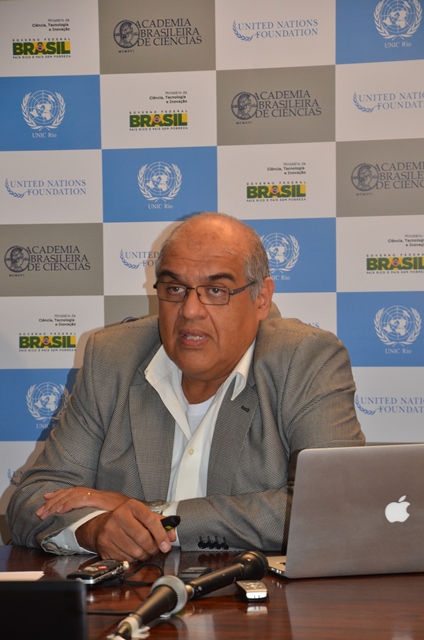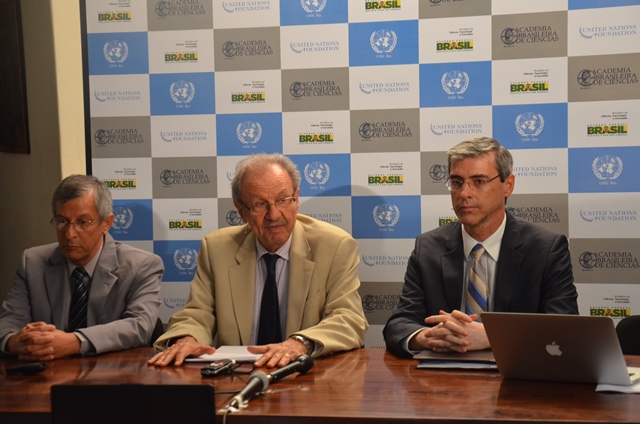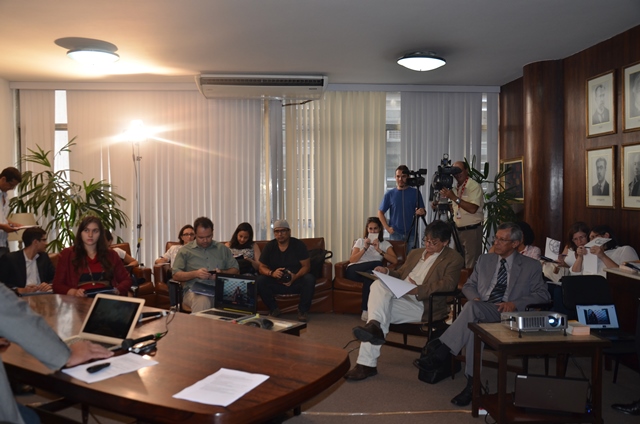On April 1st, a press conference was held at the Brazilian Academy of Sciences (ABC) to present IPCC’s AR5 Summary for Policy Makers (SPM) which was launched in Yokohama on March 31st. Under the name of Climate Change 2014: Impacts, Adaptation and Vulnerability, the work elaborated by IPCC’s Working Group 2 (WG2) specifies the future impacts and risks of climate change and the opportunities for an effective action to reduce the risks. A total of 309 scientists from 70 countries were selected to produce the report, with the support of 436 contributing authors and 1729 specialized revisers.
Jointly organized by the Brazilian Academy of Sciences (ABC), the Ministry of Science, Technology and Inovation (MCTI), the United Nations Information Center-Rio (UNIC-Rio) and by IPCC, the press conference was part of the official initiatives which will be organized globally, to disseminate the launching of WG2’s report. At the event, Professor Jose A. Marengo, author of the SPM, made a brief presentation on the report. Following the presentation, the speaker, together with Professors Carolina Dubeux and Marcos Buckeridge, who co-authored the report, answered questions posed by the journalists.
The document elaborated by the Working Group 2, is composed of two volumes. The first one contains a Summary for policy makers; a Technical Summary; and 20 chapters that assess the risks per sector and present the opportunities to address them. The sectors include freshwater resources, terrestrial and oceanic ecosystems, coasts, food, urban and rural areas, energy and industry, human health and safety, and livelihoods and poverty. The second volume, containing ten chapters, assesses the risks and opportunities to address the issues per region. The regions include Africa, Europe, Asia, Australasia (Australia, New Zealand, New Guinea and some smaller islands on the eastern part of Indonesia), North America, Central and South America, polar regions, small islands and oceans.
The report presented by the Working Group 1 was launched on September 2013, and the report of the Working Group 2 will be launched in April 2014. IPCC’s Fifth Assessment Report on Climate Change will be concluded with the publication of the Summary of Report, in October of 2014.
Working Group 2’s contribution towards IPCC’s Fifth Assessment Report (WGII AR5) is available on the following links http://www.ipcc-wg2.gov/AR5/ and http://www.ipcc.ch/.
No dia 1º de abril, foi realizada, na sede da Academia Brasileira de Ciências, uma coletiva de imprensa para apresentação do Summary for Policy Makers (SPM) do IPCC AR5, que foi lançado em Yokohama no dia 31 de março. Intitulado Mudanças Climáticas 2014: Impactos, Adaptação e Vulnerabilidade e elaborado pelo Grupo de Trabalho 2 (WG2) do IPCC, o trabalho detalha os impactos e os riscos futuros das mudanças climáticas e as oportunidades para uma ação eficaz para reduzir os riscos. Um total de 309 cientistas de 70 países foram selecionados para produzir o relatório, contando com a ajuda de 436 autores contribuintes e 1.729 revisores especialistas.
Organizada pela ABC, pelo MCTI, pela UNIC-Rio e pelo IPCC, a coletiva fez parte do rol de iniciativas oficiais que estarão sendo desenvolvidas globalmente para repercutir o lançamento do relatório do WG2. Na oportunidade, o Professor Jose A. Marengo, autor do SPM, fez uma breve apresentação do mesmo. Na sequência, o expositor e os Professores Carolina Dubeux e Marcos Buckeridge, também autores do relatório, responderam às perguntas dos jornalistas.
O documento do Grupo de Trabalho II é composto por dois volumes. O primeiro contém um Resumo para formuladores de políticas, Resumo Técnico e 20 capítulos que avaliam riscos por setor e oportunidades para resposta. Os setores incluem recursos de água doce, os ecossistemas terrestres e oceânicos, costas, alimentos, áreas urbanas e rurais, energia e indústria, a saúde humana e a segurança, além dos meios de vida e pobreza. Um segundo volume de 10 capítulos avalia os riscos e oportunidades para a resposta por região. Essas regiões incluem a África, Europa, Ásia, Australásia (Austrália, a Nova Zelândia, a Nova Guiné e algumas ilhas menores da parte oriental da Indonésia), América do Norte, Central e América do Sul, regiões polares, pequenas ilhas e oceanos.
O relatório do Grupo de Trabalho I foi lançado em setembro de 2013, e o relatório do Grupo de Trabalho III será lançado em abril de 2014. O Quinto Relatório de Avaliação do IPCC sobre Mudanças Climáticas será concluído com a publicação da Síntese do Relatório, em outubro de 2014.
A contribuição do Grupo de Trabalho II do Quinto Relatório de Avaliação do IPCC (WGII AR5) está disponível através dos links http://www.ipcc-wg2.gov/AR5 e http://www.ipcc.ch.
Na Web











